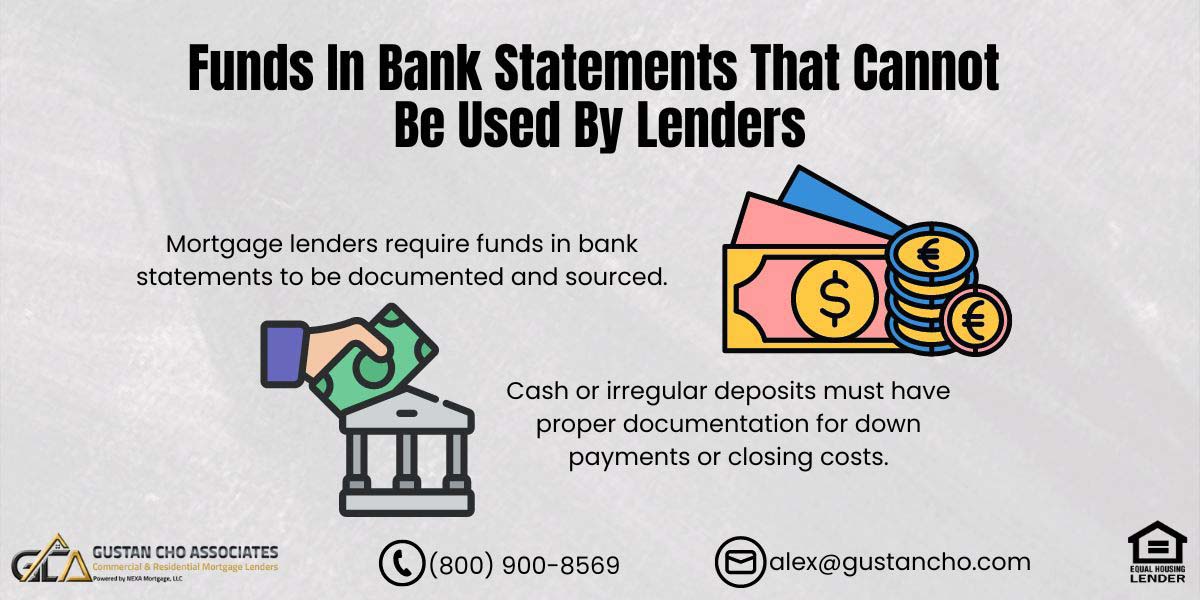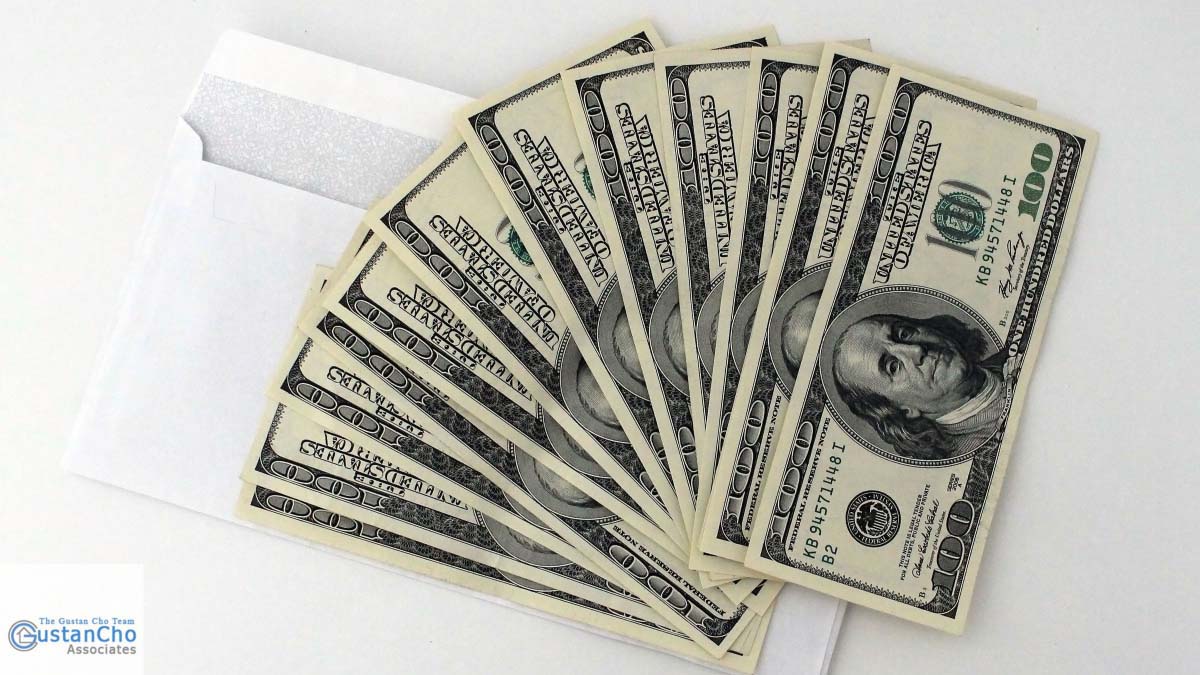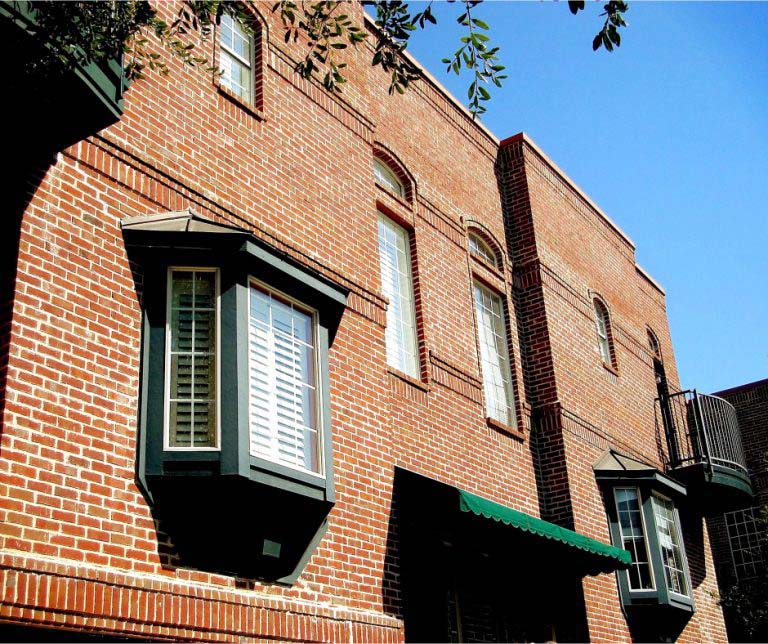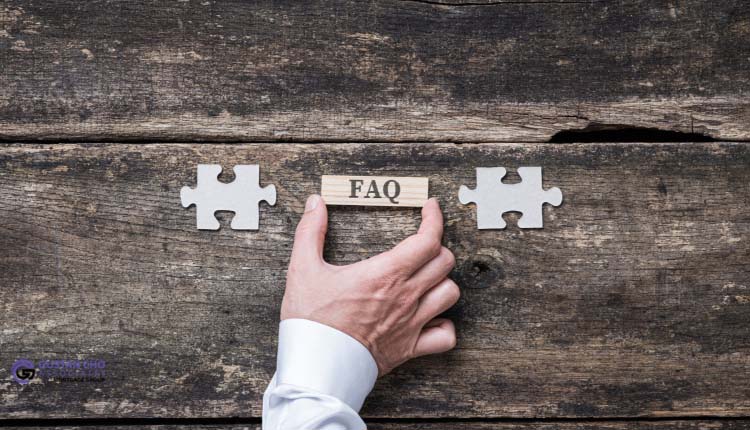This guide covers funds in bank statements that mortgage lenders cannot use. All funds in bank statements that are newer than 60 days need to be sourced. All lenders require two months of bank statements from borrowers. In order for lenders to be able to use funds in bank statements, the funds needs to be documented and sourced, says Angie Torres, the National Operations Director at Gustan Cho Associates:
Any cash deposits or irregular deposits that is not sourced or documented cannot be used by borrowers for the down payment or closing costs. Cash is non-existent in the mortgage world.
For mortgage underwriters to consider funds in bank statements as qualified funds for borrowers to use for down payment or closing costs, funds in bank statements need to be qualified, verified funds. To use towards the down payment and closing costs on a home purchase, all deposits in the past 60 days need to be sourced—any irregular deposits over $200 need to be sourced.
Borrowers cannot make a large cash deposit and use it as qualified funds if they do not have where it came from. Cash is non-existent in the mortgage world. Regular paychecks deposited every other week are no problem and can easily be sourced. However, if the borrower deposited $2,000 in cash from a side job without documentation, it cannot be used as qualified funds. Another example is when borrowers deposit large checks from a sale of a car or other high-ticket item.
Which Sources of Funds Are Not Considered Acceptable?
Acceptable sources of funds are those that comply with legal and ethical standards. This excludes money acquired through illegal means such as drug trafficking, fraud, or other criminal activity. Likewise, funds associated with terrorist financing or corruption, including bribery or kickbacks, are unacceptable.
Money obtained through tax evasion or other forms of tax fraud is also not permissible. Additionally, funds from unverified or suspicious sources and those linked to politically exposed persons (PEPs) may face rejection or closer scrutiny due to potential risks. Adhering to relevant laws and regulations regarding the legitimacy of funds is crucial for individuals and organizations to mitigate legal and reputational consequences.
Furthermore, financial institutions and other entities typically implement internal policies and procedures to assess the legality and integrity of incoming funds.
Not All Money in the Bank Can Be Used for Your Mortgage
Learn which funds are ineligible for approval—and how to avoid delays at underwriting.
Irregular And Large Deposits
Borrowers can use large irregular deposits if the deposit is documented. For example, borrowers can sell a high ticket item such as a car, jet ski, boat, motor home, or motorcycle but the paper and money trail needs to be documented. The large deposit can be used if the borrower can provide the following:
- copy of a bill of sale
- copy of title
- copy of the check
- deposit slip
- updated bank statements after the deposit
A cash sale receipt is not acceptable and cannot be used as documented and sourced funds in bank statements.
What are the Red Flags on Bank Statements for Mortgage?
When examining bank statements for mortgage applications, lenders look for several red flags that could indicate financial instability, potential fraud, or an inability to repay the loan. These warning signs include frequent overdrafts or insufficient funds in the account, which suggest poor financial management skills.
Large, unexplained deposits inconsistent with the borrower’s income or lack of proper documentation may raise suspicions regarding the source of funds or undisclosed debts. Irregular income patterns or employment gaps may indicate unstable employment, making it challenging for the borrower to meet mortgage payments.
Similarly, high levels of debt relative to income, numerous recent credit inquiries, or newly opened accounts could signify increased financial strain and affect the borrower’s ability to afford the mortgage.
Additionally, large cash withdrawals without clear explanations, multiple non-sufficient fund (NSF) fees, undisclosed liabilities, inconsistencies between the mortgage application and bank statements, and unexplained transfers between accounts may all prompt further scrutiny or even lead to the rejection of the mortgage application.
By meticulously analyzing bank statements, lenders aim to gauge the borrower’s financial stability, creditworthiness, and capacity to fulfill mortgage obligations, ensuring responsible lending practices.
What If I Have Large Amounts Of Deposits Not Sourced
Many folks have large amounts of cash in a safe deposit box, often called mattress money. Borrowers who need to use undocumented cash for a down payment on a home purchase need to source that cash. Borrowers need to deposit the cash in the bank account.
They need to show the funds in bank statements for at least 60 days to be able to use that cash towards a home purchase. Any cash deposits that have been deposited for longer than 60 days it does not need to be documented because underwriters only need 60 days’ bank statements. Mortgage lenders only ask for 60 days of bank statements, so any deposits older than 60 days will not matter.
Will Lenders Care That My Bank Statement has Weird Transactions?
When examining bank statements for mortgage applications, lenders look for several red flags that could indicate financial instability, potential fraud, or an inability to repay the loan. These warning signs include frequent overdrafts or insufficient funds in the account, which suggest poor financial management skills.
Large, unexplained deposits inconsistent with the borrower’s income or lack of proper documentation may raise suspicions regarding the source of funds or undisclosed debts. Irregular income patterns or employment gaps may indicate unstable employment, making it challenging for the borrower to meet mortgage payments.
Similarly, high levels of debt relative to income, numerous recent credit inquiries, or newly opened accounts could signify increased financial strain and affect the borrower’s ability to afford the mortgage. Additionally, large cash withdrawals without clear explanations, multiple non-sufficient fund (NSF) fees, undisclosed liabilities, inconsistencies between the mortgage application and bank statements, and unexplained transfers between accounts may all prompt further scrutiny or even lead to the rejection of the mortgage application.
Earnest Money Needs To Be Sourced Funds In Bank Statements
Homebuyers write the sellers an earnest money check and ensure the earnest money check can be sourced. Earnest money is only credited towards a down payment if it can be sourced. Some folks get cash. They then get a money order and give the money order as an earnest money deposit.
Unfortunately, the underwriter will want to see where the earnest money came from. Since it was unsourced cash, the earnest money check cannot be used as qualified funds. Home buyers giving earnest money to the seller or seller’s realtor should be given a personal check. Mortgage underwriters will want copies of canceled checks and 60 days of bank statements of the account holder of the checking account.
Funds In Bank Statements For Gift Funds
Many times when the funds in bank statements cannot be sourced, the only alternative will be for borrowers to get gift funds from a family member or relative. To use gift funds, the donor needs to sign a gift letter. The gift letter form is provided by the lender. The gift letter states that the funds are gift funds only and gift funds cannot be repaid.
Gift funds are solely a gift and not a loan. The donor needs to provide 30 days of funds in bank statements. Donor’s bank statements must show gift funds have been seasoned for at least 30 days. The donor must provide proof of funds leaving the donor’s bank account and being wired or deposited in the recipient’s bank accounts.
Bank Statement Funds May Be Flagged—Here’s What Lenders Look For
Large deposits, unverified transfers, and cash deposits can raise red flags. Let us help you document them right.
Which Mortgage Lenders Don’t Look at Bank Statements?
Some mortgage lenders offer programs that do not require traditional bank statements as part of the application process. Tenders can use different approaches to evaluate a borrower’s creditworthiness and capacity to repay the mortgage.
However, it’s important to note that the availability of these programs may vary depending on the lender and the borrower’s specific financial situation. Here are a few types of mortgage lenders or programs that might not require bank statements:
- Non-Qualified Mortgage (Non-QM) lenders: Non-QM lenders offer mortgage products that do not meet the criteria for conventional or government-backed mortgages. Lenders with less stringent underwriting criteria may be available to you, and they may not require traditional bank statements as part of their application process.
- Bank statement mortgage programs: Some lenders offer “bank statement” or “asset-based” mortgage programs where income is calculated based on deposits shown on bank statements rather than traditional income documentation such as pay stubs or tax returns. While bank statements are still required in these programs, they are used differently than in traditional mortgage applications.
- Asset depletion programs: In asset depletion programs, lenders may consider a borrower’s assets, such as retirement accounts, investment portfolios, or savings accounts, as a source of income. These programs may not require traditional income documentation or bank statements.
- No-doc or low-doc mortgages: Some lenders offer “no-documentation” or “low-documentation” mortgage programs requiring minimal financial documentation. While these programs may not specifically require bank statements, they typically come with higher interest rates or other terms to offset the increased risk to the lender.
Borrowers should conduct extensive research and compare various mortgage options to determine which best suits their financial situation and objectives. Remember that even if a lender doesn’t require traditional bank statements, they may still request other financial documentation or perform alternative forms of income verification.
Qualifying For a Mortgage With Lender With No Overlays
Gustan Cho Associates Mortgage Group has no overlays on government and conventional loans. Borrowers who need to qualify for a mortgage with a lender with no mortgage lender overlays on FHA, VA, USDA, and Conventional Loans, please get in touch with us at Gustan Cho Associates at 800-900-8569 or text us for a faster response. Or email us at gcho@gustancho.com. The team at Gustan Cho Associates is available seven days a week, evenings, weekends, and holidays.
Frequently Asked Questions (FAQ) About Funds In Bank Statements That Cannot Be Used By Lenders
- 1. What are the criteria for mortgage lenders to consider funds in bank statements? According to Angie Torres, the National Operations Director at Gustan Cho Associates, mortgage lenders require funds in bank statements to be documented and sourced. Any deposits made within the past 60 days, particularly irregular deposits over $200, must be sourced. Cash or irregular deposits must have proper documentation for down payments or closing costs.
- 2. What sources of funds are not considered acceptable by mortgage lenders? Acceptable sources of funds must comply with legal and ethical standards. This excludes money obtained through illegal means such as drug trafficking, fraud, or other criminal activities. Funds associated with terrorist financing, corruption, tax evasion, or from politically exposed persons (PEPs) are also unacceptable. Financial institutions implement internal policies to assess the legality and integrity of incoming funds.
- 3. How do mortgage lenders view irregular transactions on bank statements? Lenders scrutinize bank statements for irregular transactions that could indicate financial instability, potential fraud, or an inability to repay the loan. Common red flags include:
- Frequent overdrafts.
- Large unexplained deposits.
- Irregular income patterns.
- High levels of debt relative to income.
- Undisclosed liabilities.
These transactions may prompt further scrutiny or even lead to the rejection of the mortgage application.
- 4. Are there mortgage lenders who don’t require bank statements? Yes, some mortgage lenders offer programs that do not require traditional bank statements as part of the application process. Lenders can use other approaches to assess a borrower’s creditworthiness and capacity to repay the mortgage. Non-Qualified Mortgage (Non-QM) lenders, bank statement mortgage programs, asset depletion programs, and no-doc or low-doc mortgages are examples of such programs.
- 5. How can borrowers qualify for a mortgage with a lender with no overlays? Gustan Cho Associates Mortgage Group is an example of a lender with no overlays on government and conventional loans. Borrowers interested in qualifying for a mortgage with a lender with no mortgage lender overlays on FHA, VA, USDA, and conventional loans can contact Gustan Cho Associates for assistance. The team is available seven days a week to provide guidance and support.
This blog about Funds In Bank Statements That Cannot Be Used By Lenders was updated on April 1st, 2024.
Avoid Surprises in Underwriting: Know Which Funds Count
Mortgage lenders have strict rules for sourcing funds. Let’s make sure your assets are compliant.










